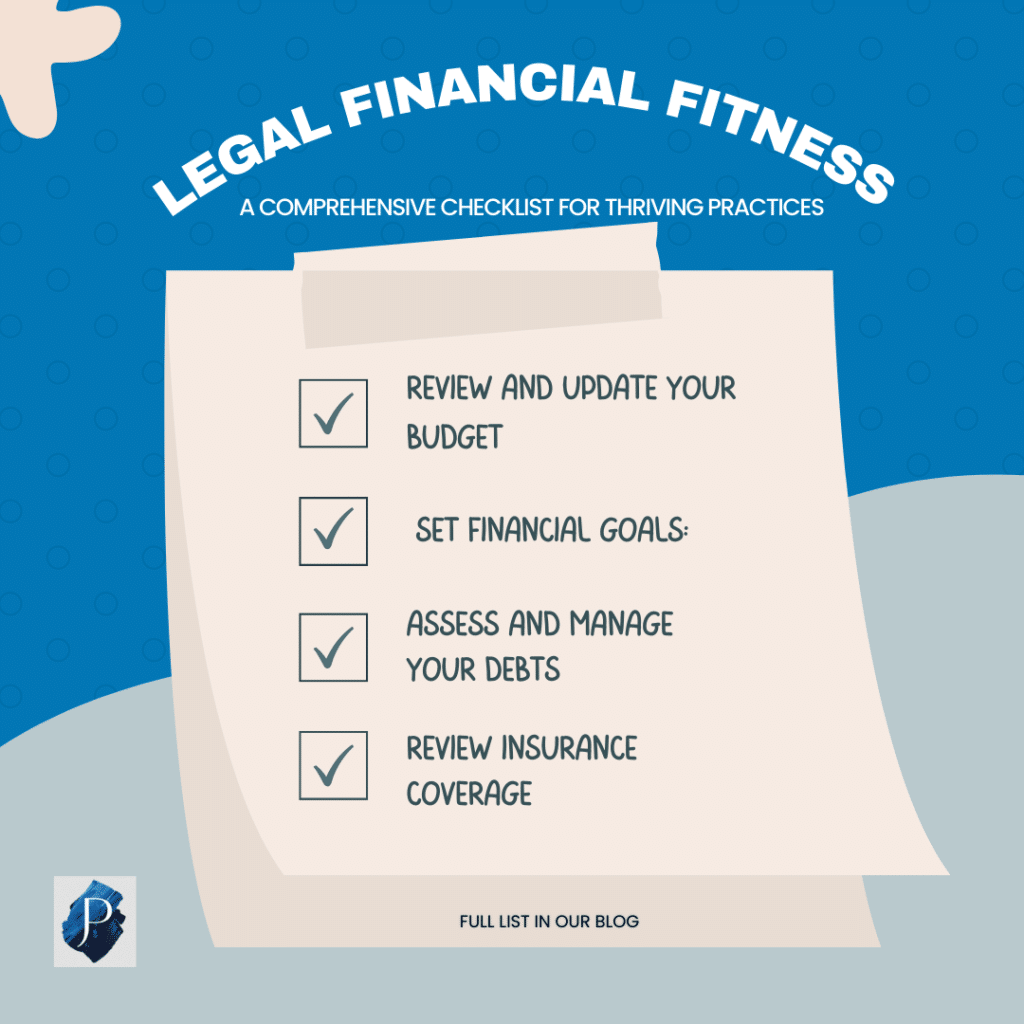Embarking on a successful financial journey is a vital aspect of maintaining a thriving legal practice. As legal professionals navigate the complexities of their careers, periodically reviewing and optimizing financial strategies becomes imperative. In this blog post, we present a comprehensive checklist tailored for legal practitioners, offering key insights to fortify their financial foundation. From budget assessments to retirement planning, these practical tips aim to empower legal professionals to achieve both short-term stability and long-term financial success.
1. Review and update your budget: Take a close look at your income and expenses to ensure you have a clear understanding of your financial situation. Make adjustments if necessary to accommodate any changes in your practice.
2. Set financial goals: Determine your short-term and long-term financial objectives, such as saving for retirement, paying off debts, or investing in your practice. Establish measurable targets to track your progress throughout the year.
3. Assess and manage your debts: Evaluate your outstanding debts, including student loans, credit card balances, or business loans. Develop a repayment plan to reduce high-interest debts and prioritize paying them off efficiently.
4. Review insurance coverage: Assess your professional liability insurance coverage to ensure it adequately protects you and your practice. Evaluate other insurance policies, such as health, disability, or life insurance, to ensure you have the appropriate coverage for your needs.
5. Evaluate and update your fee structure: Review your current fee structure and consider adjusting it if necessary. Research industry standards and market rates to ensure you are charging competitive fees while appropriately valuing your services.
6. Monitor your cash flow: Regularly track your cash inflows and outflows to maintain a healthy cash flow. Implement effective billing and collections practices to minimize any cash flow disruptions.
7. Review and update your retirement plan: Assess your retirement savings and determine whether you are on track to meet your retirement goals. Consult with a financial advisor to ensure you are maximizing tax-efficient retirement accounts and exploring investment opportunities.
8. Evaluate investment strategies: Review your investment portfolio and reassess your risk tolerance. Consider diversifying your investments and exploring opportunities that align with your financial goals.
9. Assess technology needs: Evaluate your technology infrastructure and determine if any upgrades or investments are necessary to improve efficiency, security, or client communication. Budget for any technology expenses accordingly.
10. Seek professional financial advice: Consult with a financial planner or advisor who specializes in working with legal professionals. They can provide personalized guidance based on your specific circumstances and help you navigate complex financial matters.
Remember, this checklist serves as a general guide, and it is crucial to tailor it to your unique circumstances and consult with professionals as needed.
In the dynamic landscape of legal professions, proactive financial management is an indispensable tool. Regularly revisiting your financial strategies, setting realistic goals, and leveraging professional advice are paramount for sustained success. By diligently following this checklist, legal practitioners can ensure that their financial health aligns with their career aspirations. Remember, adapting these guidelines to your unique circumstances and seeking tailored advice when needed will maximize the effectiveness of your financial plan. Here’s to a prosperous and financially secure journey in the legal realm!





More Financial News & Events
Exploring Financial and Emotional Resilience
Mindshift Mastery and Emotional Resilience
Creating a mentor mindset: How to become one or find one
Jan
Legal Financial Fitness: A Comprehensive Checklist for Thriving Practices
Jan
How to Mentally and Financially Prepare for a Layoff
Jan
2023 tax considerations you may have missed
Dec
How to Hold on to More of Your Cash this Holiday Season
Dec
Financial Moves to Make Before Year End
Dec
Navigating Stagflation: Financial Resilience in Uncertain Times
Nov
Buying and selling real estate amidst inflation
Nov
Navigating the Changing Tides: Real Estate, Inflation, and Rising Mortgage Rates
Nov
How does inflation affect your financial plan?
Nov
Caring for aging parents: The journey and lessons learned along the way
Oct
Resources For managing care for Aging Parents
Oct
Talking to Aging Parents About Finances
Oct
Living your best life: Infusing your best life into your your everyday
Oct
Living your best life: Striking the balance between enjoying life now or enjoying it later
Sep
Living Your Best Life: Client Testimonials and Insights
Sep
Unpacking FOMO: Understanding biases, emotions and financial attitudes
Aug
How to overcome FOMO to not overspend this summer
Aug
How to Overcome FOMO on Investments
Aug
What behaviours undermine your ability to build wealth
Jul
How Do You Loose Wealth
Jul
What Does Wealth Building Mean to Our Clients?
Jul
Estate Planning: What You Can Learn From the Mistakes of Celebrities
Jun
Estate Planning For Lawyers
Jun
Estate Planning for Business Owners
Jun
Managing growth for business owners
May
Are you a lawyer with questions on how to grow your investments?
May
Cultivating a growth mindset around money
May
Why financial growth can be deceptive
May
Home and Financial Document Organization
Apr
Business owners, it’s time to start spring cleaning.
Apr
Spring Cleaning Your Finances
Apr
Unique financial challenges female lawyers face
Mar
Taking Action: A Woman’s Perspective on Deciding To Tackle Her Finances
Mar
Is there a gap in your income protection?
Mar
Knowing the difference between Tax Filer and Tax Advisor
Mar
Conquering Women’s Fears Around Finances
Mar
Trends in Family Law
Feb
PART 2: Financial Conversations Couples Need To Have at Different Life Stages
Feb
Financial Conversations Couples Need To Have at Different Life Stages
Feb
Disruption and Reinvention: Starting a Second Career in your Forties
Jan
How to create a strong financial fortress during market downturns
Jan
Creating a Financial Vision Board for 2023
Jan
5 Tips to set yourself up For Financial Success in 2023
Jan
Year-end Donation strategies
Dec
Year-end tax planning
Dec
Getting clients organized for 2023
Combating Quiet Spending
Nov